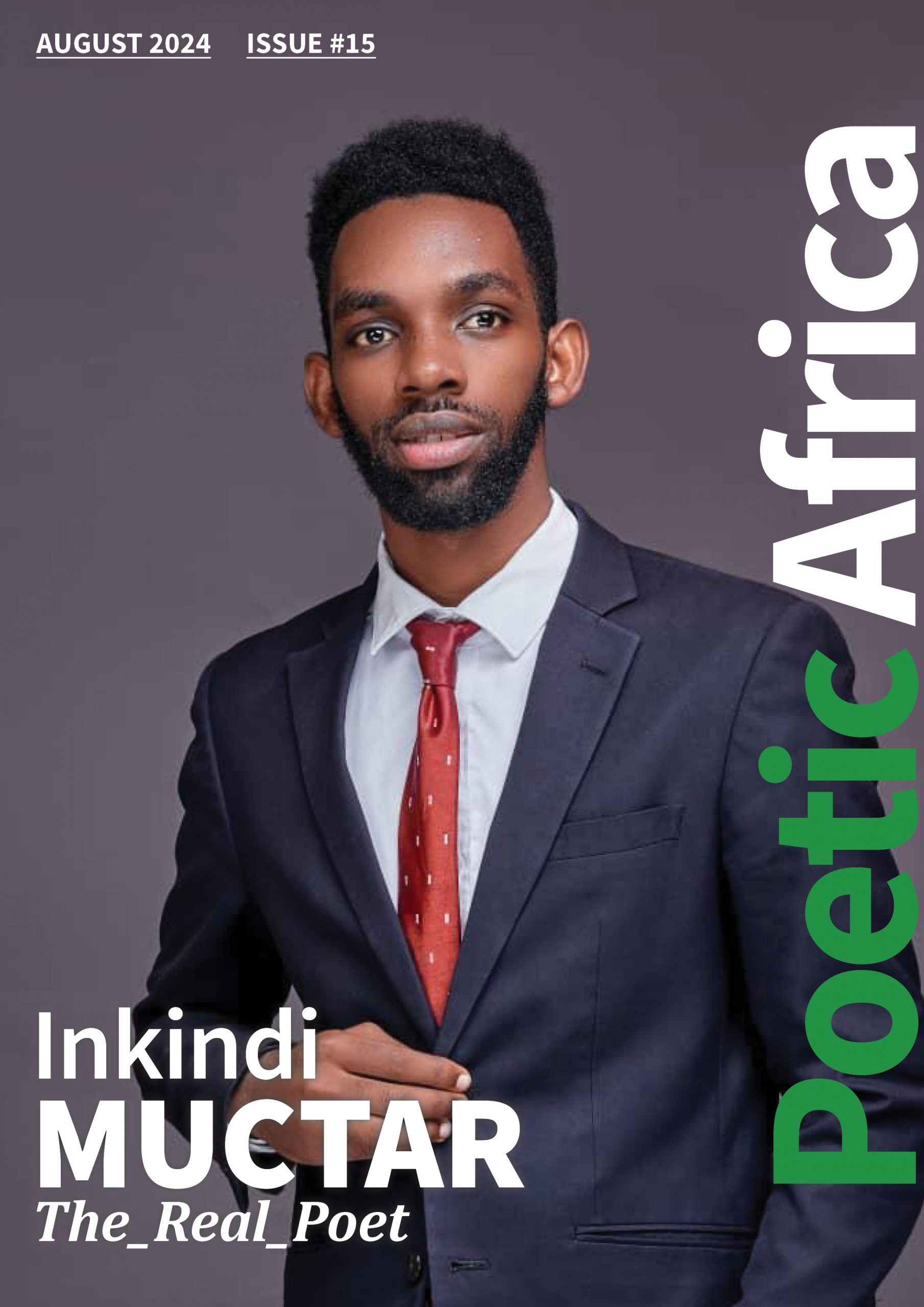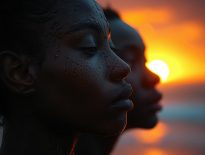This interview is By Nyasili Atetwe

—
Inkindi Muctar is a 24-year-old Rwandan poet and spoken-word artist who goes by the stage name The_Real_Poet. His art focuses on love, peace, and mental health, and he believes that art is a remedy and medicine for the soul. He has published two poetry collections: In Shadows of Memory and Tales of a Healing Heart. He has been a member of Writers Space Africa—Rwanda since 2020.
*
I am curious to know more about Inkindi Muctar.
Inkindi Muctar is a 24-year-old Rwandan male artist in the creative industry who has been on a journey of art since 2017. He started as a Poet and then found himself in other arts, such as writing, theatre performance, and acting.
Are poets born, or are poets made? Which type of poet would you call yourself?
It’s hard to answer this question, but I can say that poets are born and made. I am a born poet who learns poetry frequently because being born a poet without polishing your skills in poetry causes the poetry in you to die or become stagnant.
Who are some of the poets and poetry works that you admire most?
The list is long, but I can begin with Okot P. Bitek in his poetic book Songs of Lawino, his first poetry collection, and the famous Maya Angelou in the legendary works “I Rise” and “Why Caged Birds Sing.”
In her poem, Sylvia Plath once wrote, “I am. I am. I am.” What role has poetry played in helping you reconcile with your identity? Is this a theme that you have covered in your poetry works?
Poetry is a gate, a key to finding myself. In poetry, I saw a painting brush to express my mind’s complex and chaotic thoughts, which I thought were insane. These themes have definitely been in most of my works, mostly in my first pieces.
Read – Interview with Gankhanani Moyo
Poets often have muses or sources of inspiration. What are the sources of your inspiration?
My sources of inspiration are diverse, but I am mainly triggered to write about the misery of the people, mostly the voiceless, vulnerable communities. Secondly, my inspiration comes from problems in the youth and communities worldwide, such as mental health awareness and climate change. In addition, my other inspiration can come from the friends around me, my mood or a special occasion.
Poetry has the power to shed light on personal and societal struggles. What are some of the personal and societal issues that you have featured in your poetry?
At the start of my poetry journey, I used to write poems considering the “I”, my daily moods, my personal relationships, and my small circle of people around me. Along the way, I recognised that my poems could make a difference and greatly impact me and my small circle. I started writing poems on broader perspectives such as mental health, climate change and conservation, peacebuilding and peacekeeping, and cultural conservation.
Poems that explore abstract or philosophical concepts can pose challenges in interpretation. Is this something you consider when you are producing your work?
Being philosophical and making the work abstract is mostly done when I am with my fellow artists and poets who can understand the metaphors, personifications, and rhymes, but when I am going to address the community outside the creative industry because I mostly want them to capture the message, not let them leave the event in confusion.
Read – Interview with Scholastica Moraa
Arguably, the interpretation of poetry is a subjective affair. This often makes me wonder who determines the mood and tone of the poet: the reader or the poet?
It’s the reader. However, the reader must often read the poem to experience the poet’s words.
What is your writing process like?
My writing process starts by examining the topic I want to write about figure, figuring out the poem’s title, and then writing the first 5 to 6 lines. I share a few lines with the social networks, mostly on WhatsApp status, for the initial feedback. The next day, I revise the lines and the title, and if it is a sensitive topic, I move on by finding the correct words, the tone, and the mood if required to perform the poem. I do the same the following days, and the time frame to complete the poem depends on the length and language.
Revising and refining poems is an essential part of the creative process. Can you discuss your approach to editing and how it has shaped your final pieces?
Editing my final pieces is the cornerstone and heart of any piece before publishing. It involves correcting shortcomings and making the artwork acceptable for workshops, exhibitions, publishing houses and platforms. I consider editing the car that drives the artwork from the author to the audience.
What are some of the works you have published, and where can they be accessed? Do you have any projects in progress right now?
So far, I have two poetry collections: In the Shadows of Memories, which I co-authored with Nzeyimana Parfait (available on Amazon), and The Tales of a Healing Heart, which I co-authored with Alice Ghislaine and Constance (available on Amazon and at Ikirezi Book Store). I also have an upcoming project of a solo poetry collection titled “In the Lines of Poesy.”
Read – Interview with Liza Chuma Akunyili
Do you ever have periods of writer’s block or creative drought? What are your strategies for overcoming such periods and reigniting your creative spark?
I have those periods, mostly when I am stressed or have a lot of things and am out of time. The first time I had them, I used to fear that the poet/artist in me was dying, but with time, I learned that it happens to every poet. I overcome it by recognising that the poet in me is not dead, but he needs to rest. Also, I meditate and avoid writing under pressure, and in case it’s becoming so overwhelming that I can’t handle it by myself, I find my friends to assist. It can be like going out for hiking or any other outings.
I assume that since poetry is short-form, poets should be prolific and have a large body of work, whether published or unpublished. Is this expecting too much from poets?
Most people think that way, and most poets fall into that trap. If they don’t have any published work or a large bunch of work, they feel down on themselves and even feel like quitting, but it’s the other way around. Poetry might be a short form of a paper, but in a poet’s mind, it’s a huge thing that takes a lot of effort and courage to draft, even if it might be one poem. REMEMBER, POETRY IS ABOUT EMOTIONS, AND EMOTIONS CAN BE EXPLAINED IN DIFFERENT WAYS.
The arrival of AI tools such as CHATGPT has proved to be game changers in many aspects. With a prompt, one can churn out a poem in seconds. Isn’t this a threat to organic poets? Should poets leverage AI in their works?
AI is a threat to organic poets but also an opportunity. It can be a threat once a poet loses his track and shifts from his creativity to trusting AI and losing his originality. Still, it can also be an opportunity to have references like reading a poem of a particular poet without going to libraries. ChatGPT and other AI platforms are leading in today’s era. As poets, we can learn how to use it but not base our work on it and lose touch.
Poetry has often served as a means of cultural commentary and critique. How do you envision poetry’s role in addressing and responding to important social, political, and environmental issues in the future?
Poetry is an ancient art in all cultures, with a huge foundation in African cultures. It has been evolving and changing from generation to generation, a way of passing information, education, and entertainment.
Poetry can be a powerful tool for social impact. It can convey deep emotions, raise awareness about important issues, and inspire change. Poets often use their words to shed light on mental health struggles and societal challenges. By expressing these themes through poetry, they can reach people on a personal level and spark conversations on a personal and emotional level.
Poets can use their craft to express thoughts and emotions about the state of the world, advocating for change and raising awareness. Through poetry, individuals can explore complex political landscapes, environmental challenges, and the impact of human actions on the planet. Poems on these subjects can provoke reflection, inspire action, and encourage dialogue on important issues that affect society and our environment.







